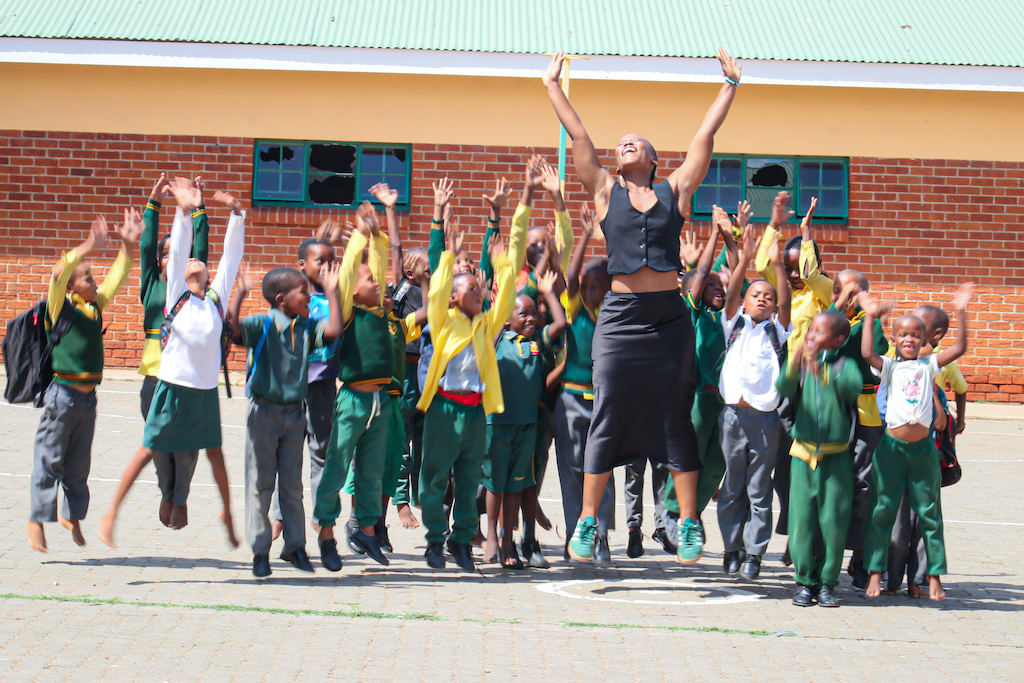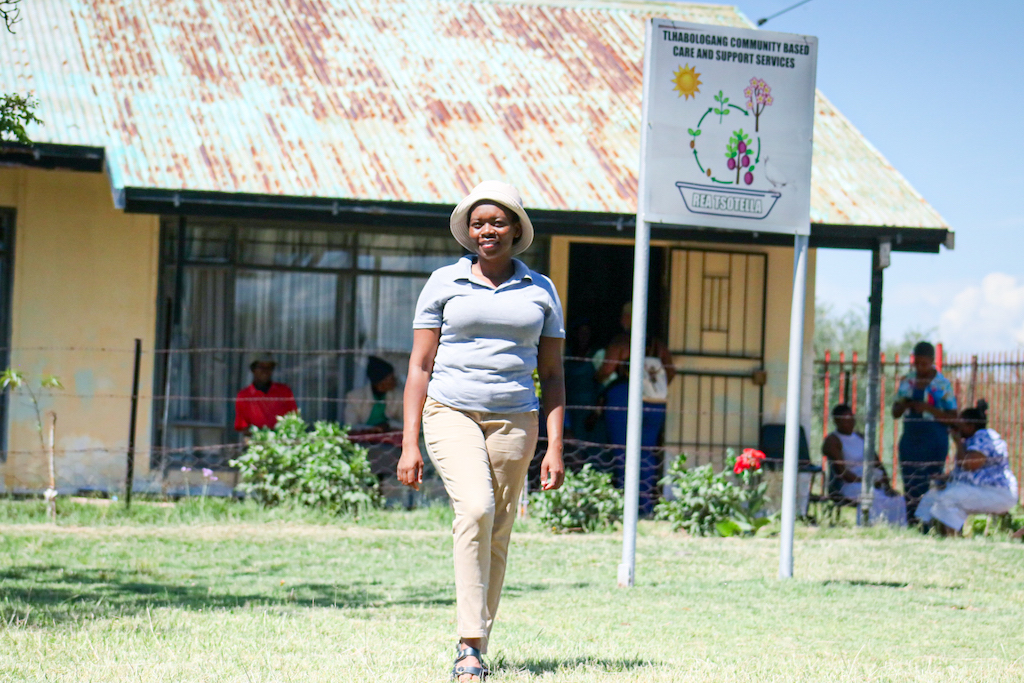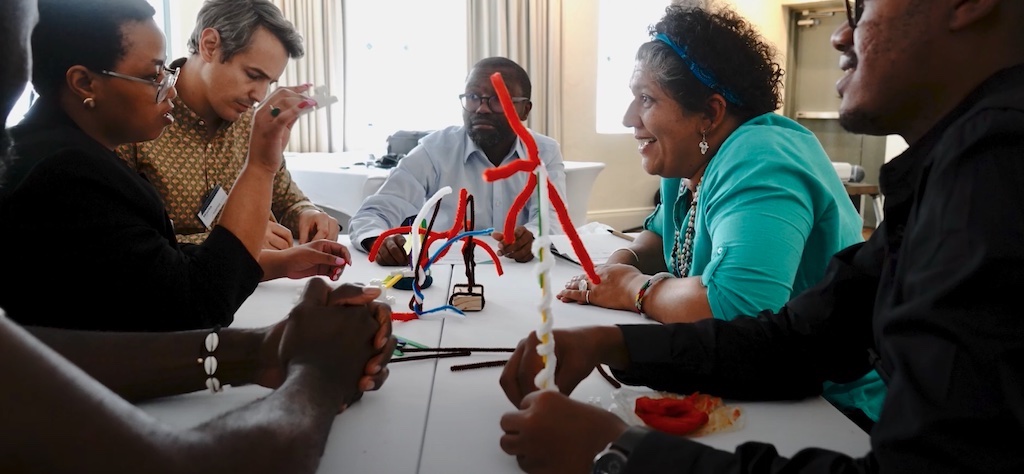
01 Apr #PowerTracker shares a bright side of renewables
Renewable energy projects are benefitting local communities, yet few people knew that they exist – let alone what their impact is. Thabo Molelekwa reports

Thousands of children have benefitted from support from community trusts like the Letsatsi Solar Park Trust, which has received more than R90-million since its inception over a decade ago. Photo: Motlatsi Mofokeng
When we first set out to investigate community trusts linked to Independent Power Producer (IPP) renewable energy projects across South Africa, we had no idea how little people knew about the work they do – or that they even exist, to begin with.
We started with a simple question: Are these trusts really making a difference?
To answer this, we visited one such trust, the Letsatsi Solar Park Trust in the Free State, to understand its operations and the impact it has on the communities it serves.
One of its key beneficiaries, Otsile Bokamoso, is an after-school education programme in Dealesville, which has aided more than 2,000 school children since 2018. With funding from the trust, the initiative has been able to help more learners, improved literacy programmes and provided essential resources, such as school supplies and uniforms. You can read more about the work Letsatsi does in our article titled Community trusts are greening the future.
We realised that most people have no idea how or why these trusts are formed, or what they do in their communities, despite there being more than 135 of them throughout South Africa.
Designed to channel benefits back into local communities, renewable energy community trusts were established by the government in 2011, with a focus on rural or underdeveloped areas. They are set up to hold a share in renewable energy projects, and ensure that the financial gains from these projects benefit the surrounding communities.
The projects are mandated to allocate a minimum 2.5% shareholding of project equity to community trusts, according to the IPP office. Many of the trusts we looked into actually exceed this minimum – on average, local communities hold 9.1% equity in these projects through community trusts.

Letshego Moeketsi, coordinator at Tlhabologang, an organisation that connects elderly community members and helps them to grow food that is used by surrounding schools. Photo: Motlatsi Mofokeng
Positive change
“Local communities on whose land this green infrastructure is erected deserve upliftment as part of compensation,” said Ncedo Mgqibisa, a researcher at the Land and Accountability Research Centre. “Green community trusts have the potential to become catalysts for positive change and community upliftment.”
The #PowerTracker feature on the Letsatsi trust “tells a story that anyone can relate to – a community problem and how a local trust stepped up to find a solution. In my opinion, the article is both educational and accessible to everyone, you know, the regular people,” Mgqibisa said.
He also praised the work the trust is doing with education-based projects: “And even more than that, they’re actually measuring the results of those projects. That’s important.”
Zukile Tom, the chief executive of the Sibona Ilanga Trust in the Northern Cape, pointed out that trusts should always target gaps so that they don’t appear to be doing the work of the government, “but rather addressing community-specific needs”.
“The #PowerTracker article does reflect a significant impact for the community as it targets a specific area in education that will ensure inclusion of excluded learners. What stood out the most for me was the transparency about the income of the trust and its implementing agencies, and the real benefits [received] by the community both young and old.”

The #PowerTracker tool shares information about community trusts across the country, liberating details about what these investments are and how they work. Image: #PowerTracker
What the data shows
These trusts receive millions each year from the renewable energy projects, which they use to help uplift their immediate communities. For example, we reported that Letsatsi has received more than R94-million since its inception in the past 13 years.
And yet information about them is not easily accessible. Our team has managed to share information about 59 community trusts on our #PowerTracker mapping tool, and we will continue to dig.
We asked experts why so little is known about this community-focused funding mechanism? They agreed that there seems to be a lack of general understanding of what community trusts are responsible for.
According to #PowerTracker data, some of the ways in which these trusts are helping local communities include job creation, financial compensation (for use of the land), contributing money and resources to educational programmes, developing food security through agricultural projects and upgrading existing infrastructure.
Francisco Domingues, former head of the socio-economic department at the IPP Office, said: “This investigation will go a long way to introduce the trust concepts for those that are not familiar with them.”

Participants at the recent Inspire workshop, where a framework designed to ensure trusts are not only legally compliant but also effective in delivering on their socio-economic mandates was explored. Photo courtesy Inspire
Turning point
We attended a recent workshop convened by the Initiative for Social Performance in Renewable Energy (Inspire) that focused on strengthening community trusts. The gathering, attended by more than 160 participants participants, explored the newly introduced Trust Maturity Framework, a tool designed to ensure trusts are not only legally compliant but also effective in delivering on their socio-economic mandates.
Holle Wlokas, chief executive of Inspire, said the workshop marked a turning point for community trusts. “They’ve not been convened in those numbers before. Our previous provincial workshops attracted a few trusts here and there, but now, having a national platform for these discussions is really powerful. I hope this grows into something even bigger.”
- Find more investigations and track renewable energy projects on our #PowerTracker platform here
